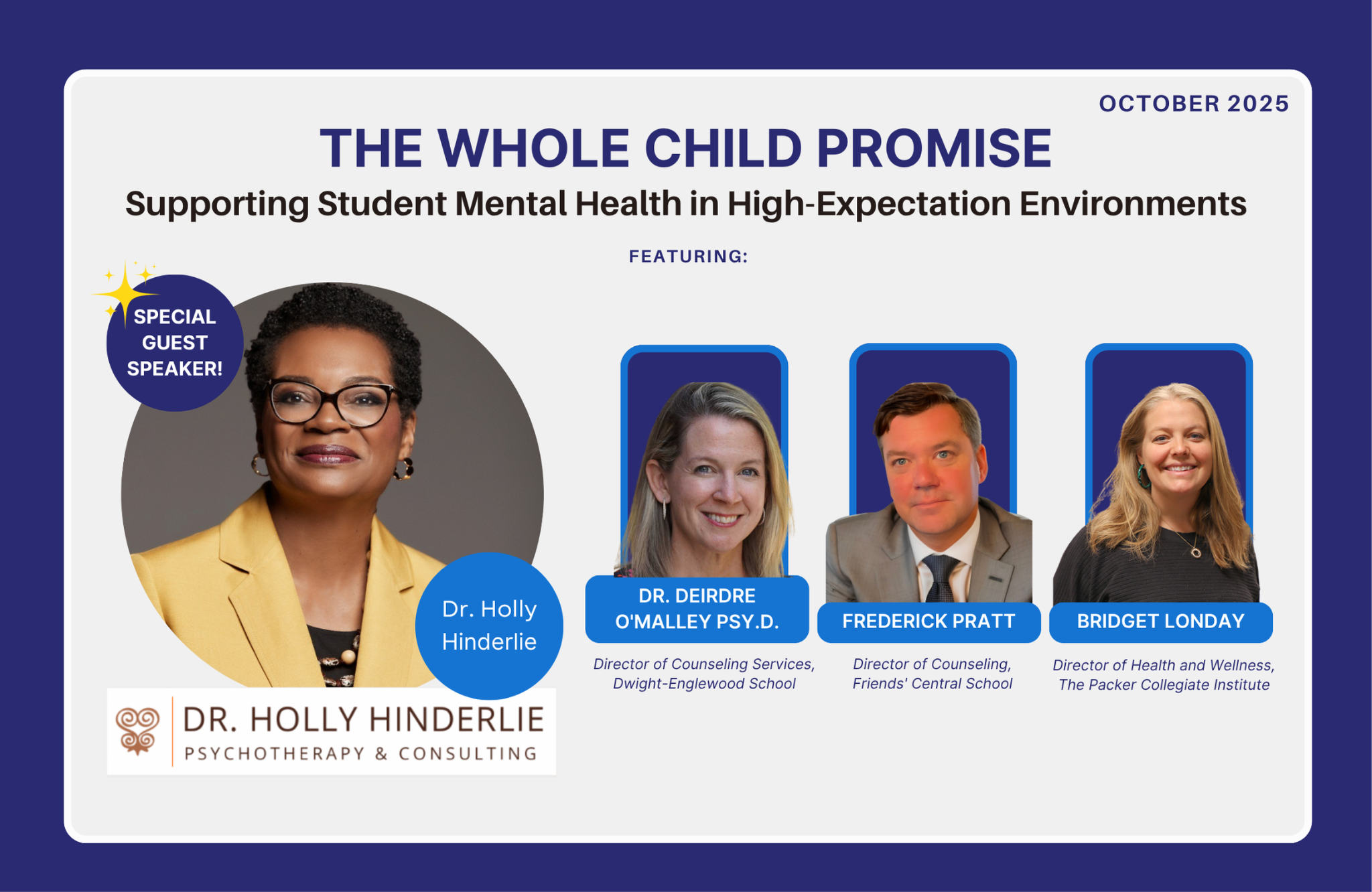Independent schools face a delicate balance: maintaining academic excellence while genuinely supporting the whole child. During October's Connected Schools webinar, four experienced education professionals shared practical insights about creating environments where students can thrive both academically and personally.
The conversation revealed a fundamental shift happening across independent schools—from reactive crisis management to proactive, community-wide approaches that prioritize student wellbeing alongside academic success.

Our Panel of School Leaders
This month, we were joined by:
Dr. Holly Hinderlie, Licensed Psychologist - Our featured expert brought 20 years of experience supporting students in high-performing independent schools, including her work as Director of Counseling at Maret School and most recently at Holton Arms School. Her specialty focuses on adolescent development, particularly supporting girls of color in academic environments.
And three trusted voices from the independent school community:
Frederick Clemens Pratt, LPC, ACS - Director of N-12 Support Services & Counselor at Friends' Central School (Philadelphia, PA), with over twenty years of experience in independent schools as both counselor and teacher.
Bridget Londay - Director of Health and Wellness at The Packer Collegiate Institute (Brooklyn, NY), bringing 18 years of healthcare experience and expertise in community health programming.
Dr. Deirdre O'Malley, Psy.D. - Director of Counseling Services at Dwight-Englewood School (Ridgewood, NJ), with 17 years of psychology experience and specialization in psychological assessment and psychotherapy.
The Turning Point: When Mental Health Became Essential
For many schools, the pandemic served as a critical moment of clarity. "The pandemic was a moment in which we were very, very clear—if we were ignoring student mental health before, we can't do that anymore," shared Dr. Holly Hinderlie, a licensed psychologist with 20 years of experience in high-performing independent schools.
This realization extended beyond students to encompass entire school communities.
As Dr. Deirdre O'Malley from Dwight Englewood School explained, "What kids need is a big picture, systematic, all hands on deck kind of approach. Kids' mental health is really incumbent on all of us—it's all of our responsibilities."
The shift represents more than policy changes; it reflects a deeper understanding that mental health support isn't separate from academic excellence—it's essential to it.
Building Systems That Work: Practical Approaches
Comprehensive Health Education as Foundation
At Packer Collegiate Institute, Bridget Londay has seen remarkable results from prioritizing dedicated health education. Students receive health instruction from kindergarten through fourth grade, continue with expanded programming in middle school, and complete full-year courses in ninth and tenth grades.
"By and large, I think the biggest impact for schools is to create time in the schedule for health education and hire actual health educators," Londay emphasized.
This approach allows schools to address complex topics thoughtfully—from brain development to decision-making skills to understanding the difference between typical sadness and clinical depression.
Student-Led Initiatives
Dr. Hinderlie found particular success with student-led programming. "The initiatives that I found most effective at my former school were student-led and student-run," she noted. These programs included annual student-led conferences where upperclassmen defined issues relevant to their school context and facilitated meaningful conversations with their peers.
Community Partnerships
Frederick from Friends Central School emphasized the importance of authentic, ongoing relationships with trusted community partners rather than one-time presentations. Their approach involves bringing in substance use experts who return multiple times throughout the year, creating continuity and deeper connections with students.
Understanding Student Experience: What Educators Observe
The conversation highlighted patterns the educators have observed in their schools. Dr. Hinderlie described students who appear to be "paddling very fast, like a duck under the water, of trying to keep all of those relationships afloat and pleasing others."
Dr. O'Malley noted that students in high-achieving environments can become "extra good at looking like they have it all together," which makes it important for adults to look beyond surface appearances and create opportunities for authentic connection.
The experts identified several behaviors they commonly observe, including perfectionist tendencies that interfere with learning, social anxiety around belonging, and academic anxiety that goes beyond healthy motivation.
Supporting Families: Cultural Sensitivity and Collaboration
One of the webinar's most important discussions centered on partnering with families whose cultural backgrounds may shape their understanding of mental health differently. Dr. Hinderley emphasized the universal nature of parental concern: "I have never dealt with a parent whose child was having mental health issues that wasn't scared at some level."
The key lies in approaching these conversations with cultural humility and genuine curiosity. As Frederick noted, "I think it's also really important that I channel my inner Mr. Rogers or my curiosity about people and where they're coming from and where the challenges are."
The experts suggested practical approaches including taking time to understand families' cultural perspectives, explaining processes clearly rather than assuming familiarity, and creating parent affinity groups that address specific community needs.
Creating Supportive Environments: Where to Begin
For school leaders wondering how to start or strengthen their approach to student wellbeing, the panelists offered clear guidance:
Start with Education
"I think all the constituencies kind of need to have a basic understanding of what mental health looks like and what are the issues for our kids," Dr. Hinderlie advised. This includes professional development for faculty, parent education programs, and age-appropriate instruction for students.
Listen to Students
"I want to make a plug for asking your students what do they need."
Dr. Hinderlie continued. "Students oftentimes know so well what they need." Regular surveys, focus groups, and informal conversations can provide invaluable insights into student experiences.
Set Realistic Boundaries
Bridget Londay shared how her school implements practical limits on student commitments: "We did have some rules about how many special programs you could be a part of, how many honors classes you could take at one time, how many clubs you could lead at one time." These boundaries help prevent overcommitment while teaching valuable prioritization skills.
The Parent Partnership Piece
The conversation emphasized that supporting student mental health requires intentional parent engagement.
Simple changes can make significant impacts, such as Bridget Londay's advice to parents: "Pay attention to the first question you ask your kid when they walk in. Is it, 'How was the math test?' Because what does that communicate to them about your priorities?"
Instead, she recommends starting with broader questions like "Tell me about your day" before addressing academic concerns.
Moving Forward: Creating Supportive Environments
The webinar revealed that effective student support in high-achieving schools isn't about choosing between academic excellence and student wellbeing—it's about recognizing that they're interconnected. When schools create comprehensive environments that address the whole child, students are better equipped to handle challenges and reach their full potential.
As Dr. O'Malley concluded, the goal is helping students "feel like they matter beyond just their achievement, that they matter just for being a person, a human being, and not just based on their accomplishments."
This work requires patience, cultural sensitivity, and ongoing commitment from entire school communities. The key is starting with your school's unique context, listening carefully to your community's needs, and creating environments that can adapt and grow over time.
Resources for Further Learning
The panelists recommended several valuable resources:
Books & Publications
- "The Price of Privilege" by Madeline Levine PhD
- "Parenting from the Inside Out: How a Deeper Self-Understanding Can Help You Raise Children Who Thrive” - by Daniel Siegel M.D. and Mary Hartzell
- "Never Enough: When Achievement Culture Becomes Toxic-and What We Can Do About It" by Jennifer Wallace
Organizations & Programs
- Authentic Connections - Research organization that partners with NAIS, led by Dr. Sunia Luthar who coined the term for high-achieving schools as a risk group
- Independent School Health Check - Assessment tool as an alternative to Authentic Connections survey
- Speak Up - 25-year-old organization that facilitates dialogue between students, teachers, and parents
- Mental Health First Aid (MHFA) - Offers Youth Mental Health First Aid courses for teachers, coaches, parents, plus teen versions for health curriculum
- Freedom Institute - Research organization that conducted studies on high-risk behaviors, depression, and anxiety rates among students in affluent school settings.
For school leaders ready to take the next step in supporting student mental health, remember that this work is ongoing and evolving. Start with your community's unique needs and build systems that can grow over time. Watch the full webinar here.
Latest articles

The Partnership Difference: How Your Safety Vendor Becomes Your School's Strategic Ally

Why January Planning Sets Your School Up for August Success



